商务英语谈判课件余慕鸿chapter1
- 格式:docx
- 大小:14.52 KB
- 文档页数:2

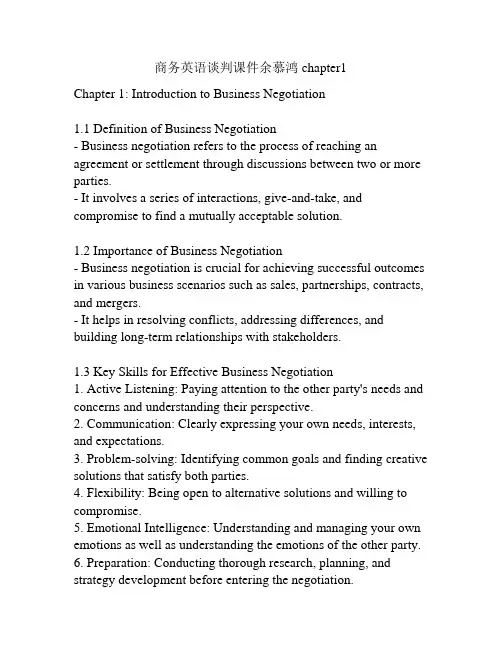
商务英语谈判课件余慕鸿chapter1Chapter 1: Introduction to Business Negotiation1.1 Definition of Business Negotiation- Business negotiation refers to the process of reaching an agreement or settlement through discussions between two or more parties.- It involves a series of interactions, give-and-take, and compromise to find a mutually acceptable solution.1.2 Importance of Business Negotiation- Business negotiation is crucial for achieving successful outcomes in various business scenarios such as sales, partnerships, contracts, and mergers.- It helps in resolving conflicts, addressing differences, and building long-term relationships with stakeholders.1.3 Key Skills for Effective Business Negotiation1. Active Listening: Paying attention to the other party's needs and concerns and understanding their perspective.2. Communication: Clearly expressing your own needs, interests, and expectations.3. Problem-solving: Identifying common goals and finding creative solutions that satisfy both parties.4. Flexibility: Being open to alternative solutions and willing to compromise.5. Emotional Intelligence: Understanding and managing your own emotions as well as understanding the emotions of the other party.6. Preparation: Conducting thorough research, planning, and strategy development before entering the negotiation.7. Patience: Remaining calm and composed during tense moments, and avoiding impulsive decisions.8. Negotiation Ethics: Upholding ethical standards and values such as honesty, fairness, and transparency in the negotiation process. 1.4 Different Approaches to Business Negotiation1. Competitive Approach: Focusing on one's own interests and trying to maximize benefits at the expense of the other party. This approach can lead to win-lose outcomes.2. Cooperative Approach: Collaborating with the other party to find mutually beneficial solutions. This approach aims for win-win outcomes.3. Integrative Approach: Combining elements of both competitive and cooperative approaches. It involves creating value through trade-offs and expanding the resources available to both parties. 1.5 Common Challenges in Business Negotiation1. Different Interests: Parties may have conflicting interests and priorities.2. Communication Barriers: Language barriers, cultural differences, and misinterpretations can lead to misunderstandings.3. Power Imbalance: One party may have more power or leverage in the negotiation, creating an uneven playing field.4. Emotions and Personality: Emotional reactions, egos, and personal conflicts can hinder the negotiation process.5. Time Pressure: Limited timeframes and deadlines can add pressure and impact decision-making.1.6 Strategies for Successful Business Negotiation1. Preparation: Gather relevant information, understand the otherparty's position, and define your own objectives.2. Building Rapport: Establish a positive relationship with the other party through trust, respect, and active listening.3. Finding Common Ground: Identify shared interests and goals to create a foundation for collaboration.4. Effective Communication: Clearly and concisely communicate your needs, preferences, and proposed solutions.5. Managing Emotions: Stay calm and composed, acknowledge emotions, and find constructive ways to address them.6. Flexibility: Be open to compromises and explore alternative options to reach a mutually satisfactory agreement.7. Closing the Deal: Ensure that the negotiated agreement is documented and all parties understand and accept the terms. References:- Lewicki, R. J., Saunders, D. M., & Barry, B. (2010). Negotiation: Readings, Exercises, and Cases.- Shell, G. R. (2006). Bargaining for advantage: Negotiation strategies for reasonable people. Penguin.- Salacuse, J. W. (2007). The global negotiator: Making, managing and mending deals around the world in the twenty-first century. Macmillan.。

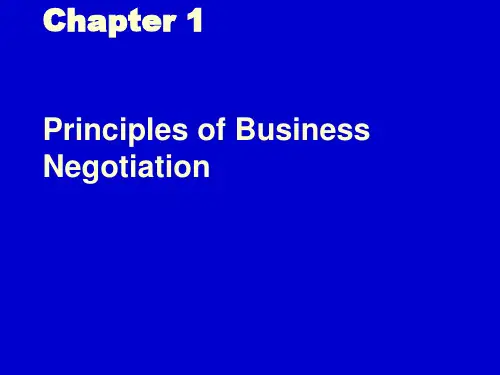

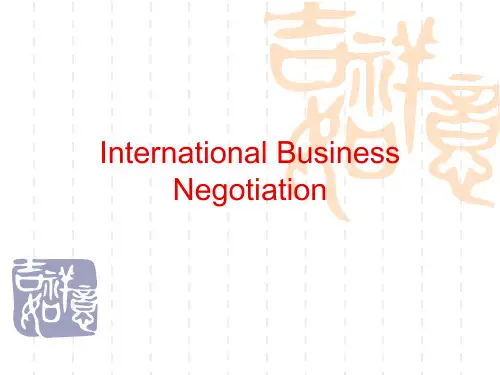
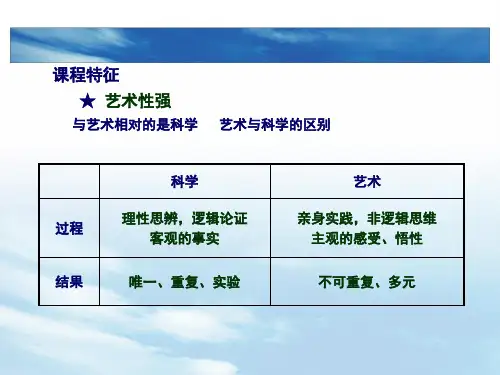
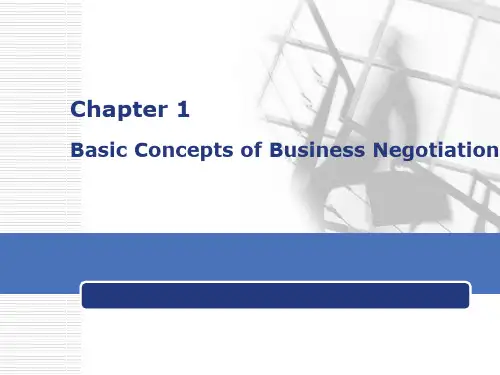
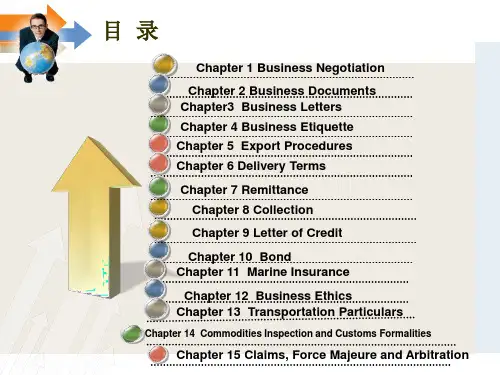


商务英语谈判课件余慕鸿chapter1
摘要:
1.商务英语谈判的基本概念和重要性
2.商务英语谈判的基本流程与策略
3.商务英语谈判中的实用技巧与常见问题
4.商务英语谈判案例分析与实践应用
正文:
一、商务英语谈判的基本概念和重要性
在当今全球化经济环境下,商务英语谈判在国际贸易、跨国合作和涉外项目中扮演着举足轻重的角色。
商务英语谈判是指在商务活动中,双方或多方为了达成共识,通过交流、沟通、协商、妥协等手段,解决分歧,实现合作目标的过程。
在这个过程中,参与者需要具备扎实的英语基础、专业知识和良好的沟通能力。
二、商务英语谈判的基本流程与策略
商务英语谈判的基本流程通常包括以下几个阶段:准备阶段、开局阶段、实质阶段、协议阶段和总结阶段。
在每个阶段,谈判者需要运用不同的策略,包括信息收集、目标明确、策略制定、沟通协调、妥协与达成共识等,以达到谈判目的。
三、商务英语谈判中的实用技巧与常见问题
在商务英语谈判中,掌握一定的实用技巧有助于提高谈判效果。
这些技巧包括:善于倾听、表达清晰、善于发问、保持耐心、善于总结等。
同时,谈判
者还需要注意应对常见的问题,如文化差异、语言障碍、利益冲突等。
四、商务英语谈判案例分析与实践应用
为了更好地理解和掌握商务英语谈判的技巧和策略,我们可以通过分析实际案例来进行学习。
例如,在国际贸易谈判中,双方如何通过有效沟通、妥协与合作,达成互利共赢的协议。
在跨国合作项目中,如何解决文化差异、语言障碍等问题,推动项目顺利进行。
总之,商务英语谈判在全球化背景下具有重要意义。